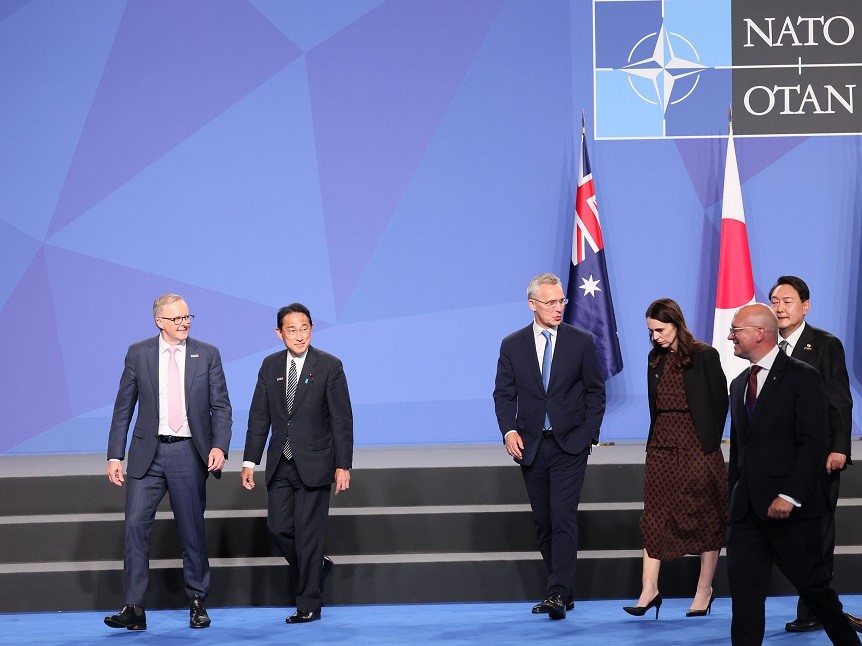
NATO’s 2022 Madrid summit marked a shift to taking a truly global approach to strategic competition by including Indo-Pacific regional partners as participants for the first time. The presence of Australia, Japan, New Zealand and South Korea—the so-called AP4—highlighted the increasingly global nature of security issues and perceived challenges to the rules-based international order. The summit declaration concluded:
We are confronted by cyber, space, and hybrid and other asymmetric threats, and by the malicious use of emerging and disruptive technologies. We face systemic competition from those, including the People’s Republic of China, who challenge our interests, security, and values and seek to undermine the rules-based international order.
In this context, NATO is preparing to convene its 2023 summit in Vilnius, Lithuania, next week. Among the issues to be considered will be developments in the war in Ukraine and the Russia–China ‘no limits’ partnership and their implications for NATO’s Indo-Pacific partners. The AP4 will be there again.
NATO Deputy Secretary General Mircea Geoana, in an address to the NATO and the Indo-Pacific Conference in Vilnius in April, clarified that while China is ‘not our adversary’, its ‘assertive behaviour and coercive policies challenge our values, our interests and our security’. He expressed concern about ‘the growing alignment of Russia and China’, noting that ‘China refuses to condemn Russia for its unjust and unprovoked war against Ukraine’. Instead, he said, China ‘seeks to maintain the appearance of carefully balanced neutrality, while also amplifying Russia’s false narratives and disinformation’.
NATO is thus seeking to strengthen relations with the AP4 and actively foster cooperation with like-minded countries around the globe.
A Chinese defence spokesperson later slammed the West for ‘judging China and China–Russia relations with a Cold War mentality’ and said that ‘under the strategic guidance of the Chinese and Russian heads of state, China and Russia have set up a paradigm of a new type of international relations and have forged their ties based on non-alliance, non-confrontation, and not targeting any third party’. Events in Ukraine and the militarisation of the South and East China Seas, however, don’t support these assertions.
The focus of the Vilnius summit will depend partly on whether Ukraine can drive Russian forces from enough of its territory to allow Kyiv to negotiate a stable peace with Moscow. Unifying NATO allies behind the goal of enabling a Ukrainian victory is a strategic priority. Last year, NATO’s entire force posture and planning were transformed after the Russian invasion and those measures were formally approved at Madrid. Vilnius could be similarly important.
Finland will also be welcomed as a full member, and Sweden’s accession, while delayed by Turkish concerns, should still be fast-tracked so it can fully participate in operational and defence planning, thus increasing Nordic–Baltic security.
The Atlantic Council identified a number of other security concerns for the summit. These include the extent to which Beijing’s Belt and Road Initiative is strengthening China’s control over elements of critical European infrastructure, increasing Chinese influence operations aimed at undermining the political cohesion of NATO and Europe, China’s expanding security cooperation with Russia including support for its territorial ambitions in Ukraine, and President Xi Jinping’s commitment to growing China’s military capabilities and how that challenges the rules-based international order.
A Vilnius discussion session on China that includes the AP4 is planned to examine implications for both Europe and the Indo-Pacific if a US–China conflict were to erupt over Taiwan. With shared values of freedom, democracy and the rule of law under increasing pressure, Euro-Atlantic security is now viewed as interconnected with Indo-Pacific security. Indeed, the Lithuanian government this week approved its own Indo-Pacific strategy, paving the way for stronger bilateral connections with Australia.
For Australian Prime Minister Anthony Albanese, this session will be of profound significance, bringing into sharp focus both the benefits and risks for Australia of ever-closer NATO links. While the war in Ukraine will dominate the summit, it’s also an opportunity to more critically examine the systemic challenge to the status quo posed by the rise of China and promote transatlantic–transpacific cooperation.
NATO’s leaders view their Indo-Pacific partners’ presence at the summit as more than symbolic. Potentially larger roles for the AP4—and other prospective regional allies—will be crucial to responding to China and Russia’s increasing alignment. With the military, economic and industrial implications of a war over Taiwan currently being calibrated with the aim of developing both deterrence and collective resilience, involving the AP4 in NATO’s planning has never been more important.
NATO allies at Vilnius will also be asked to address Chinese investment in their civilian infrastructure and its associated risks, and share their experiences of economic coercion, hostage diplomacy and intellectual property theft. They will also collaborate on supply-chain risks, political disinformation and strategies for countering foreign influence. Australia will benefit from being involved in these discussions.
The balancing act is most delicate—China is a crucial trading partner for so many—but Albanese’s attendance in Vilnius should show Australia’s support for democracy, peace and security, upholding the international rule of law, and solidarity with Ukraine, while still promoting Australia’s prosperity.

